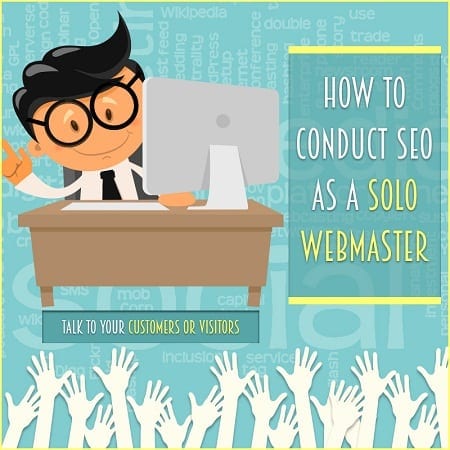 Most webmasters are not part of large corporate teams or big agencies. They are small guys- running websites on their own as a career or even as a side gig to their day jobs. For this majority, search engine optimization (SEO) can seem like a daunting task, particularly in competitive niches. When you are up against competitors who have deep pockets and lots of resources, it is natural to feel overwhelmed. But you should not let you lose hope because while resources are one thing, the strategy is a whole other and without the right strategy even the most endowed of competitors will not be able to do much in terms of end results. So what should you do to make sure your strategy is rock solid and your execution even better? Follow the advice below to give you a strong start.
Most webmasters are not part of large corporate teams or big agencies. They are small guys- running websites on their own as a career or even as a side gig to their day jobs. For this majority, search engine optimization (SEO) can seem like a daunting task, particularly in competitive niches. When you are up against competitors who have deep pockets and lots of resources, it is natural to feel overwhelmed. But you should not let you lose hope because while resources are one thing, the strategy is a whole other and without the right strategy even the most endowed of competitors will not be able to do much in terms of end results. So what should you do to make sure your strategy is rock solid and your execution even better? Follow the advice below to give you a strong start.
The first thing you really need to nail is your targeted keywords and key phrases. It may seem boring or tedious but without getting this right nothing else will matter. Ranking for keywords that no one searches for means you get zero traffic and trying to go for keywords that are well beyond your reach will mean you won’t rank well and again will get very little traffic. Use the Google Keyword Planner tool to put your website in and see the keyword ideas that it automatically generates. Try doing this for some of your competitors as well and build out a list with the top keywords from all of them that you think are realistic to rank for.
Once you have your target keywords in mind, you should start optimizing your content to rank for those. Long-tail keywords (those which are usually 3+ words) are a low-hanging fruit which can get you a smaller volume, but steady stream of traffic quicker. Shorter keywords tend to be more competitive and in turn, also take some more time to do well with. Remember this when you are writing your content and have a good mix of both without overdoing it (Google will notice if you keyword stuff or do anything fishy these days and that will hurt you).
Another great way to get keyword ideas is to talk to your customers or visitors. They are the ones who found you and possibly searched for you or for similar services. So they know the thought process of someone in that situation and what types of keywords they might enter into the search engine. These insights can be tremendously valuable to you. There are many ways that you can ask them- it can be through surveys, face to face discussion, a website form, etc. If you have a community-based website or a website that has a loyal following, then you can simply ask them and sell it as a means to help the site grow which is usually in the interest of the existing community. They will be happy to offer what insights they can to help propel your website.
Once you have the right keywords and your content optimized for them, it is time to make sure that your on-page SEO is optimized. Title tags and H1 tags are particularly important these days and should be used to effectively highlight your key content and keywords. Meta description is still important too because of how search engines use it in SERPs – it becomes the last sell to a potential visitor from a search engine before they land or do not land on your web page. Alt tags can be great to help you rank for images and to make your pages seem more dynamic as well.
Regardless of whether you are a small business or just a niche hobby website, one thing that will always be important is to make sure that your content is top notch. Visitors come for one reason and that is the content and they will only stay and keep coming if it is great and updated. Put a good amount of your resources into this bucket because the ultimately content is king. Good luck in your SEO journey. Take it one step at a time and follow the key points described above you are bound to rank well in the coming months and years.
Please contact Affordable SEO to schedule a free consultation on how to bring more visitors to your websites and therefore more clients for your business.
